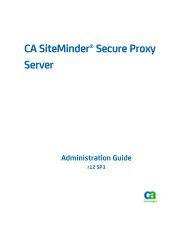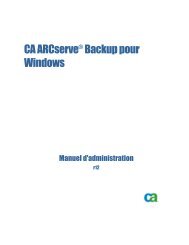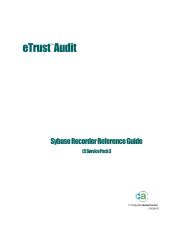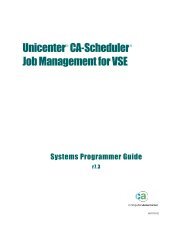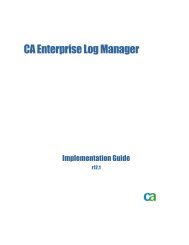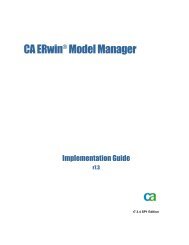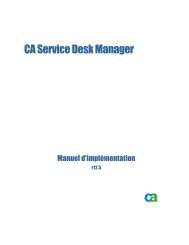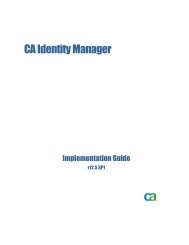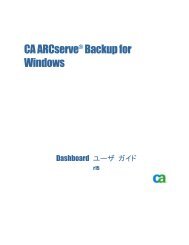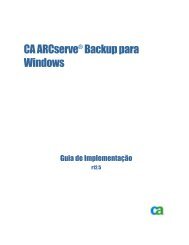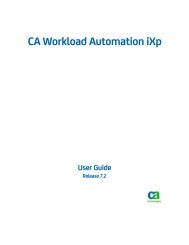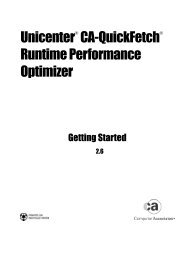Unicenter CA-Scheduler Job Management for VSE User Guide
Unicenter CA-Scheduler Job Management for VSE User Guide
Unicenter CA-Scheduler Job Management for VSE User Guide
You also want an ePaper? Increase the reach of your titles
YUMPU automatically turns print PDFs into web optimized ePapers that Google loves.
Glossary<br />
This glossary defines terms used in all volumes of<br />
<strong>Unicenter</strong> <strong>CA</strong>-<strong>Scheduler</strong>'s documentation, but<br />
sometimes one new term leads to another. To help<br />
you grasp these new ideas quickly, we have used<br />
italics to highlight related terms worth<br />
cross-referencing.<br />
abend. Abnormal ending. An early termination of<br />
a program due to an error.<br />
accounting day. A day designated on a datetable as<br />
part of a cyclic production, sales, or accounting<br />
period.<br />
accounting period. One or more accounting days.<br />
accounting week. A week containing at least one<br />
accounting day.<br />
active. Schedules and jobs that are:<br />
■<br />
■<br />
■<br />
■<br />
Waiting at any workstation <strong>for</strong> predecessors,<br />
start time, or defined resources<br />
Waiting at a non-CPU station to be started<br />
manually<br />
Submitted, held, or started<br />
Completed, interrupted, abended, or failed<br />
The opposite of inactive.<br />
array. A variable parameter with multiple values.<br />
authority level. One of three different types of<br />
access assigned to users using the TYPE field on a<br />
user record. Each authority level places different<br />
restrictions on what those <strong>Unicenter</strong> <strong>CA</strong>-<strong>Scheduler</strong><br />
users can do. See General, Supervisor, and Manager<br />
authority levels.<br />
authorized users. <strong>User</strong>s with General authority level<br />
who are allowed to maintain and control a schedule<br />
and its jobs because they are listed in the USERS<br />
field on that schedule's base record. (<strong>User</strong>s with<br />
Supervisor or Manager authority level do not<br />
require specific authorization to maintain or control<br />
schedules.)<br />
autoscan. The automatic selection of a day's<br />
workload. <strong>Unicenter</strong> <strong>CA</strong>-<strong>Scheduler</strong> scans the<br />
database at a set time every day to determine the<br />
workload <strong>for</strong> the next 24 hours.<br />
autoscan day. The 24-hour period starting with<br />
autoscan. Also called the production day.<br />
AUTOTIME. The time when <strong>Unicenter</strong><br />
<strong>CA</strong>-<strong>Scheduler</strong> automatically scans its database <strong>for</strong><br />
workload selection. This defaults to midnight, but<br />
may be modified with the AUTOTIM installation<br />
option. Also called autoscan time.<br />
available. Ready <strong>for</strong> processing by <strong>Unicenter</strong><br />
<strong>CA</strong>-<strong>Scheduler</strong>. A schedule is available (ready to<br />
start) when its early start time has been reached and<br />
all of its predecessors have been satisfied. A job is<br />
available (ready to be submitted) when its schedule<br />
has started, the job's early start time has been<br />
reached, all the job's predecessors have been<br />
satisfied, and the resources defined <strong>for</strong> that job are<br />
available (not in use).<br />
backlog. Work that was not completed one day<br />
and was carried over to the next. References to a<br />
backlogged schedule or job pertain to a previous<br />
day's schedule or job which is included in today's<br />
workload.<br />
backout job. A replacement job that is<br />
automatically submitted by <strong>Unicenter</strong> <strong>CA</strong>-<strong>Scheduler</strong><br />
when a job abends provided that<br />
ABEND=BACKOUT on the abended job's base<br />
record.<br />
base record. The record which is required to define<br />
a schedule or job. There is a schedule base record<br />
(SBR) and a job base record (JBR).<br />
Glossary X-1



